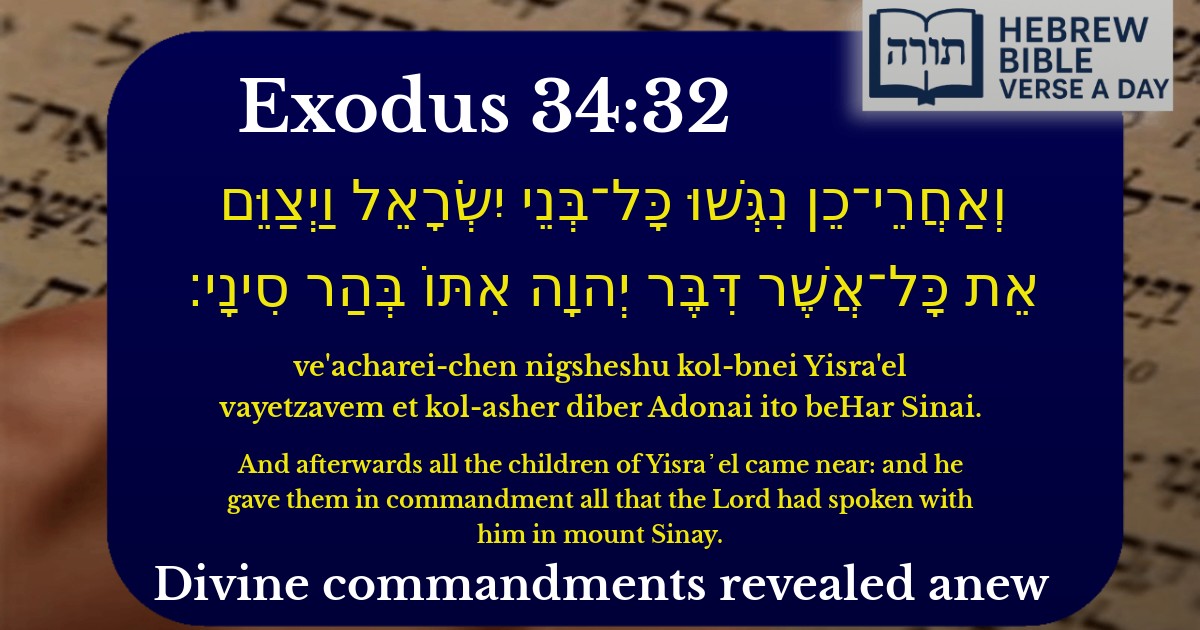Join Our Newsletter To Be Informed When New Videos Are Posted
Join the thousands of fellow Studends who rely on our videos to learn how to read the bible in Hebrew for free!
Hebrew Text
וְאַחֲרֵי־כֵן נִגְּשׁוּ כָּל־בְּנֵי יִשְׂרָאֵל וַיְצַוֵּם אֵת כָּל־אֲשֶׁר דִּבֶּר יְהוָה אִתּוֹ בְּהַר סִינָי׃
English Translation
And afterwards all the children of Yisra᾽el came near: and he gave them in commandment all that the Lord had spoken with him in mount Sinay.
Transliteration
Ve'acharei-chen nigsheshu kol-bnei Yisra'el vayetzavem et kol-asher diber Adonai ito beHar Sinai.
Hebrew Leining Text
וְאַחֲרֵי־כֵ֥ן נִגְּשׁ֖וּ כׇּל־בְּנֵ֣י יִשְׂרָאֵ֑ל וַיְצַוֵּ֕ם אֵת֩ כׇּל־אֲשֶׁ֨ר דִּבֶּ֧ר יְהֹוָ֛ה אִתּ֖וֹ בְּהַ֥ר סִינָֽי׃
Parasha Commentary
📚 Talmud Citations
This verse is not quoted in the Talmud.


Context in the Torah
The verse appears in Shemot (Exodus) 34:32, following the episode of the Golden Calf and Moshe's second ascent of Har Sinai to receive the second set of Luchot HaBrit (Tablets of the Covenant). Rashi explains that this gathering occurred after Moshe had already instructed the elders and leaders, and now the entire nation approached to receive the commandments directly.
The Sequence of Transmission
Ramban (Nachmanides) notes that the phrase "וַיְצַוֵּם אֵת כָּל־אֲשֶׁר דִּבֶּר ה' אִתּוֹ" ("he gave them in commandment all that the Lord had spoken with him") indicates a structured transmission process:
The Significance of "All the Children of Israel"
The Midrash Tanchuma (Ki Tisa 34) emphasizes that the phrase "כָּל־בְּנֵי יִשְׂרָאֵל" ("all the children of Israel") highlights the unity of Klal Yisrael in accepting the Torah. Unlike the first reception at Har Sinai—where the people were overwhelmed by the divine revelation—this time, they approached willingly and with full understanding.
Moshe's Role as Intermediary
The Malbim explains that Moshe's role here was not merely to relay information but to command (וַיְצַוֵּם)—implying a binding transmission of halachic obligations. This underscores the authority of Torah She'Ba'al Peh (Oral Torah), as Moshe clarified and expanded upon the written commandments.
Connection to Teshuvah (Repentance)
The Sforno connects this event to the aftermath of the Golden Calf. The people's willingness to approach Moshe after their sin demonstrates their sincere teshuvah and renewed commitment to the covenant. The verse thus symbolizes the restorative power of Torah after spiritual failure.